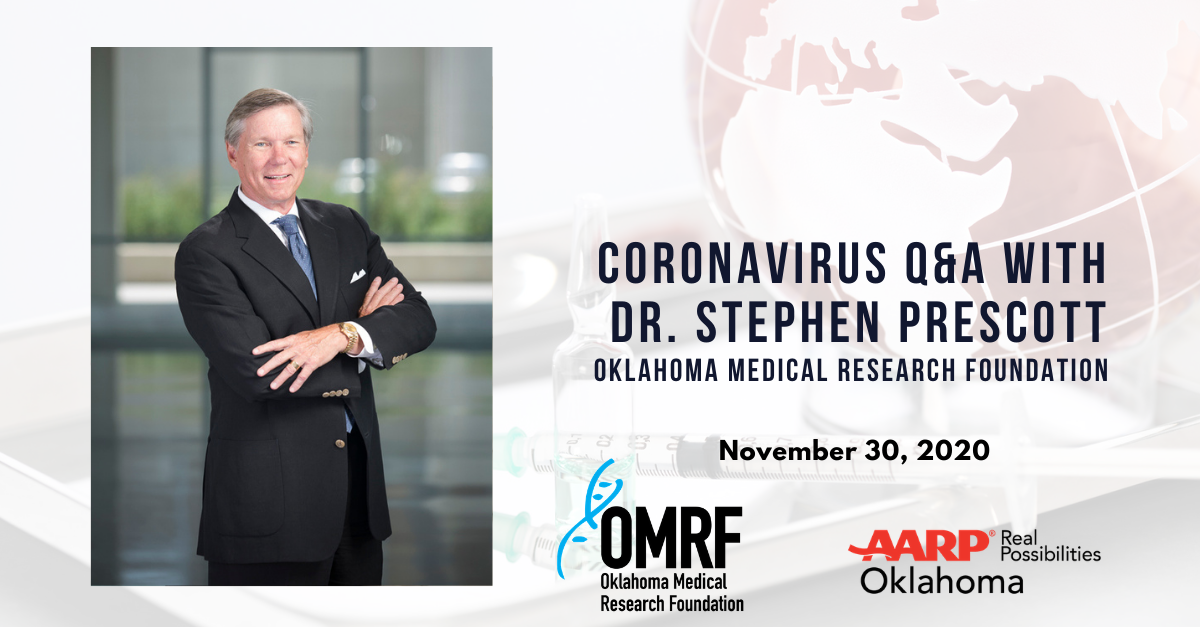AARP Hearing Center

Dr. Stephen Prescott, Oklahoma Medical Research Foundation president, answers your medical questions about coronavirus and COVID-19.
I have heard that certain mouthwashes can help reduce the spread of COVID-19. Is there any merit to these claims?
“No. SARS-CoV-2 is a respiratory virus, meaning it’s predominantly in your airways, nasal passages and lungs. The mouth is only one conduit for respiration. Mouthwash may kill active germs in your mouth, but once you start breathing or coughing again, the virus comes right back up. A mouthwash can’t cleanse what’s in your lungs, upper airways or nose.”
There are now at least three vaccines pending approval. Are these vaccines safe, and when will they be available?
“Following three stages of clinical trials, two drugmakers — Pfizer and Moderna — have submitted applications to the U.S. Food and Drug Administration for emergency use approval of their respective vaccines. A third drugmaker, AstraZeneca, has said it will do the same. For approval, data from clinical trials undergo thorough review by a large team of FDA experts well as an outside panel. When vaccines receive FDA approval, you can feel good about taking them. It appears one or more of these vaccines will receive approval by the end of the year. If that happens, the first people to receive them will be our frontline health care workers. High-risk populations, like older adults and those in long-term care facilities, would be next. The CDC says all adults should be able to get vaccinated in 2021.”
Once vaccines are made available to the public, will I have a choice in which brand-specific vaccine I am able to receive?
“At least initially, probably not. But having numerous vaccines on the market is fantastic, as it will allow us to better avoid shortages related to manufacturing and distribution. The FDA is requiring at least 50% effectiveness for Covid-19 vaccines. Moderna and Pfizer report their vaccines to be 94.5% and 95% effective, respectively. That’s wonderful news.”
I am unable to avoid upcoming travel during this time period of heightened outbreak numbers. What safety precautions should I take when traveling in an airplane or staying in a hotel?
“Keep your mask on, have hand sanitizer at the ready, and maintain distance when you’re waiting in lines. Studies have shown that the air circulation in airplanes is very good, something that helps diffuse the virus. The airport itself presents many more chances for transmission. Do what you can to minimize contact with others: Check in for your flight at home, bring your own food and stick to a carry-on bag.
For hotels, find out in advance what precautions they’re taking. Are employees wearing masks? What about guests? Small things will make a difference: Keep your distance at the check-in desk, ride in elevators only with your family, avoid common areas and take your plate back to your room instead of eating at the breakfast buffet.”
What safety precautions should I take with family during the holidays?
“The safest thing to do is to stay home and enjoy the holidays with those in your immediate household. If you still opt to travel, or invite people to come see you, everyone should get tested. But remember that tests are not a guarantee of a Covid-free event. Viruses build over days, and a test only tells us what viral load was at the moment a swab was inserted into your nose.
Keep gatherings short, and keep attendance as low as possible. Wear a mask when you’re around people who don’t live with you and keep the windows open. If the weather allows, dine outside. Skip family-style or buffet meals and instead pick one person to plate everyone’s dinner. Use disposable plates and utensils. Physically distance from one another. Together, all of these can make a difference.”
Related articles:
Coronavirus Q&A with Dr. Stephen Prescott: October 19 Update
Coronavirus Q&A with Dr. Stephen Prescott: September 24 Update
Coronavirus Q&A with Dr. Stephen Prescott: September 1 Update
Coronavirus Q&A with Dr. Stephen Prescott: August 24 Update
Coronavirus Q&A with Dr. Stephen Prescott: August 4 Update
Coronavirus Q&A with Dr. Stephen Prescott: July 24 Update
Coronavirus Q&A with Dr. Stephen Prescott: April 28 Update
Coronavirus Q&A with Dr. Stephen Prescott: April 9 Update
Coronavirus Q&A with Dr. Stephen Prescott: April 2 Update
Coronavirus Q&A with Dr. Stephen Prescott: March 26 Update
AARP and coronavirus
AARP has been working to promote the health and well-being of older Americans for more than 60 years. In the face of this pandemic, AARP is providing information and resources to help older people and those caring for them protect themselves from the virus and prevent it spreading to others. AARP is compiling facts and resources about coronavirus and how you can protect yourself. We’re updating this information as rapidly as we can to ensure our AARP members have the information they need at www.aarp.org/coronavirus.































































